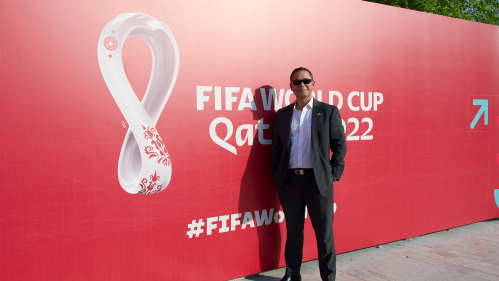FIFA World Cup Security for U.S. Is Led by Rutgers Grad

Kenneth Greenblatt doesn’t know much about the game of soccer and would never consider himself a “football” fan, but he is playing a crucial role at the 2022 FIFA World Cup Qatar, ensuring the security of the U.S. Men’s National Team and the more than 50,000 Americans who have traveled to the Middle East.
“My number one priority is keeping Americans in Doha and the team safe,” said Greenblatt, who works for the U.S. Department of State’s Diplomatic Security Service as the senior World Cup security coordinator in Doha, Qatar. “That has meant building trust and relationships with counterparts from Germany, France, England, Turkey, and mostly with Qataris.”
For Greenblatt, the games, which kicked off Sunday, represent the end of a very rewarding but also high-stress assignment. There will be 64 matches among 32 teams over 29 days. It will be the most compact World Cup ever, with all stadiums located in just one city.
The 1995 Rutgers grad has been in the country for the past 16 months coordinating all U.S. government security and law enforcement support and engagement with Qatar security services and partners from more than 13 countries. His job has involved making sure to connect with the right people, meeting with the Ministry of Interior and FIFA about security policies and regulations and helping make sure U.S. government VIP visitors are safe and secure.
“You can’t overlook anything,” Greenblatt said. “There are so many moving parts and you must make sure you do all you can to ensure that there is proper coordination and no lack of communication or any distrust. “
Greenblatt is used to working in a pressure cooker environment. He arrived in Qatar to begin preparing for the World Cup on Aug. 15, 2021, the day Kabul, the capital of Afghanistan, fell and the Taliban took over.
Soccer was put on hold and Greenblatt – with more than 20 years in the U.S. Department of State’s Diplomatic Security Service – supported a multi-agency task force, evacuating Americans, Afghan civilians, U.S. Embassy employees and others to safety.
“I’ve been in dangerous positions where I had to apply my training and skills, remain cool and calm and do what I can to keep people safe,” said Greenblatt, who has a master’s degree in strategic studies from the U.S. Army War College.
A black belt holder in kickboxing and Kyokushin karate, Greenblatt has spent much of his time overseas in Iraq, Afghanistan, Tunisia, Democratic Republic of the Congo, Lebanon, Libya and Turkey with both foreign diplomatic and security partners. He served two U.S. ambassadors to the United Nations in New York: former South Carolina Governor Nikki Haley and human rights advocate Samantha Power.
Prior to his World Cup assignment, Greenblatt was the special agent in charge of the Diplomatic Security Service resident office in Colorado. There he led a team of special agents investigating and prosecuting federal crimes, including human and labor trafficking, international fugitives and U.S. passport and visa fraud.
Greenblatt was raised in Mexico and Atlantic City. His single mother, who was born in Mexico, worked two jobs to care for him and his two older brothers. Growing up in an economically disadvantaged household, coming to Rutgers provided life-changing opportunities.
“Rutgers made such a difference for me, it gave me the chance I needed,” Greenblatt said. “No one who I grew up with went to college. Rutgers was so diverse that it helped me learn how to deal with people from all over the world.”
At Rutgers, Greenblatt, who graduated with honors with a dual degree in history and political science, was president of Tau Kappa Epsilon fraternity, founder and president of Students Engaged at Rutgers for Volunteering (SERV) and president of the McCormick Suites residence hall.
One of his proudest moments was when he was selected to represent the university at a gift-giving ceremony for President Bill Clinton, who visited Rutgers in 1993 to announce the start of AmeriCorps – an independent agency that works to improve lives, strengthen communities and foster civic engagement through service and volunteering around the country.
Greenblatt presented Clinton with a Rutgers t-shirt in a moment that helped inspire his own lifelong dedication to service. That meeting is one of the reasons Greenblatt decided to join the Peace Corps after graduation. His 27 months in Central Asia, where he taught English, was challenging.
“I thought it was my calling, but it was hard,” he said. “With $10 a month you needed to give 30 percent to your host family and use the rest for food. We used ration cards to get bread, butter, sugar and other basic items” he said.
Before getting a job with the State Department and the Foreign Service, Greenblatt worked for the U.S. Immigration and Naturalization Service in New York, where he spent two months at Ground Zero after 9/11.
Greenblatt has spent his career managing challenging situations and the World Cup is no different. He has worked many long days over the past 16 months focusing on security protection to ensure that the games are safe.
He gets up early, spends five minutes meditating and completes one task he has on his list even before heading out the door to work. Taking time for his well-being helps him remain positive and keeps him focused.
“As the senior World Cup security coordinator for the Diplomatic Security Service, my job is to help protect U.S. citizens, the U.S. Men’s National Team, U.S. corporate stakeholders and members of the U.S. media, and that means working closely with our U.S., local and international security partners to get the job done right,” said Greenblatt. “Security is a team effort.”


